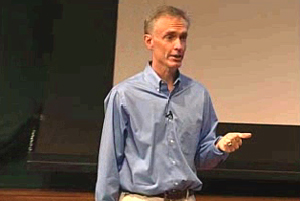Making Some Noise
Jim Collins delivers the 2008 University lecture, Biology by Design

Click here to watch Jim Collins on BUniverse.
Jim Collins, a College of Engineering professor of biomedical engineering and codirector of the Center for BioDynamics at Boston University, delivers the 2008 University Lecture,Biology by Design. He talks about his research at BU, including usingnoise to enhance sensory function and making antibiotics more effectiveby tricking cells to turn off their repair mechanisms.
Collins explains how he used computer modeling of neurons to determinehow the mechanism of stochastic resonance can be applied to increasethe sensitivity of our sense of touch. Using technology such asvibrating insoles, Collins says, he has been able to improve thebalance of a 75-year-old, making it comparable to that of a 20-year-old.
He also describes how he used control system networks to measure theresponses of proteins and better predict how particular drugs work onthe human body. Collins learned that he could turn off the cell repairmechanism of specific cells and that if he could hit one of those cellswith an antibiotic, the antibiotic would be a thousand times morepowerful than it is when the repair mechanism is on.
Established in 1950 to honor faculty engaged in outstanding research, the University Lectureis an opportunity for the members of the BU community and the public tohear a distinguished scholar discuss a topic of recognized excellence.
October 21, 2008, 7 p.m.
Tsai Performance Center
About the speaker:
Jim Collinsis a College of Engineering professor of biomedical engineering, aUniversity Professor, and codirector of the Center for BioDynamics atBoston University. He is one of the founders of the emerging field ofsynthetic biology and is a pioneering researcher in systems biology,stochastic resonance, biological dynamics, and neurostimulation.
Collins earned a bachelor’s degree in physics from the College of theHoly Cross in 1987 and a doctorate in medical engineering from theUniversity of Oxford in 1990. He was a Rhodes scholar from 1987 to1990, when he joined the BU faculty. In 2000, he was awarded the Metcalf Cup and Prize for Excellence in Teaching, BU’s highest teaching honor.
In 2003, Collins received a MacArthur Foundation“genius award,” becoming the first bioengineer to receive this honor.In 2005, he was named one of 50 outstanding leaders in science andtechnology by Scientific American. Two years later, Collins received the NIH Director’s Pioneer Award and the Ellison Medical Foundation Senior Scholar Award in Aging. This past year, he was selected as a Howard Hughes Medical Institute investigator, becoming the first member of the BU faculty to receive this distinction.
Comments & Discussion
Boston University moderates comments to facilitate an informed, substantive, civil conversation. Abusive, profane, self-promotional, misleading, incoherent or off-topic comments will be rejected. Moderators are staffed during regular business hours (EST) and can only accept comments written in English. Statistics or facts must include a citation or a link to the citation.